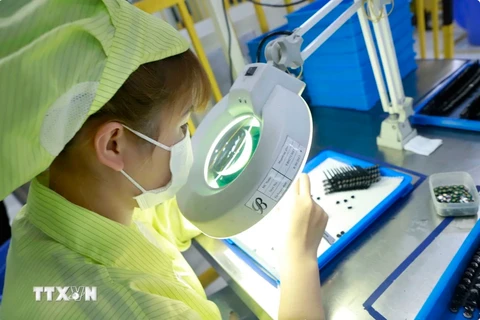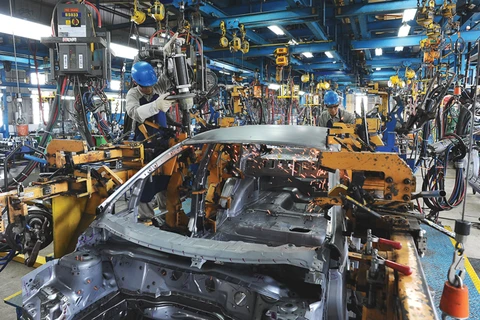
Hanoi (VNA) – With significant strides in mechanical engineering, particularly in agriculture, Vietnam is now working to increase the localisation rate in industrial production.
According to the Ministry of Industry and Trade (MoIT), domestic companies have successfully manufactured a wide range of planting and harvesting machines, significantly increasing mechanisation in agricultural production. Over 90% of rice milling and polishing machines, and dryers are now produced domestically with advanced technology, and these products have been exported to ASEAN countries, the Americas, and Africa. Additionally, several coffee and cashew processing equipment have been developed in the country.
In the sectors of bicycle and motorcycle parts as well as standard mechanical components and plastic-rubber parts, Vietnamese companies have largely met domestic demand and are also exporting their products to foreign markets. Notably, in the field of electronics, the number of Vietnamese firms participating in Samsung's supply chain surged to 306 by the end of 2023 from 25 in 2014.
However, the ministry recognises ongoing challenges, particularly in complex industries requiring high technical standards, such as the automotive sector. The electronics industry also faces a low localisation rate, with most electronic products on the Vietnamese market being either imported as complete units or assembled domestically from imported components.
Nguyen Van Toan, Vice President of the Vietnam Association of Foreign Invested Enterprises, emphasised that to attract and effectively utilise foreign direct investment (FDI), Vietnam needs to support domestic businesses in providing supplementary products to FDI firms at competitive prices. This strategy will help retain major FDI investors, develop local businesses, and gradually increase the localisation rate.
The MoIT is currently leading efforts to support domestic suppliers by connecting them with multinational corporations, both within Vietnam and abroad. This includes the establishment of technical centres, modeled after those in the Republic of Korea, Japan, and Thailand, to enhance the technical and managerial capabilities of local industrial enterprises and better meet the demands of multinational corporations and FDI firms.
Key focus areas for support include the textile and garment, leather and footwear, electronics, automotive assembly and manufacturing, high-tech industries, materials and metalwork, mechanical engineering, electronics, and food and biotechnology industries.
The ministry is also actively seeking investment opportunities domestically and internationally to help expand the markets for Vietnamese supporting industry businesses./.






















